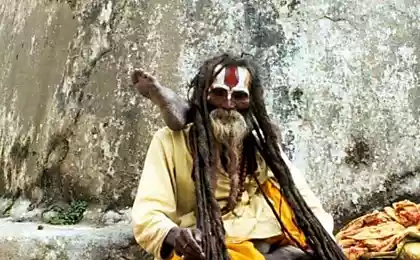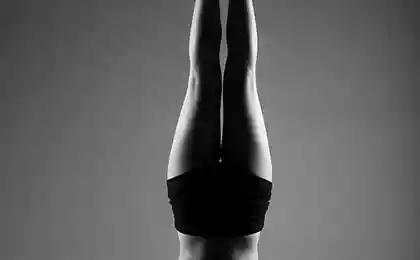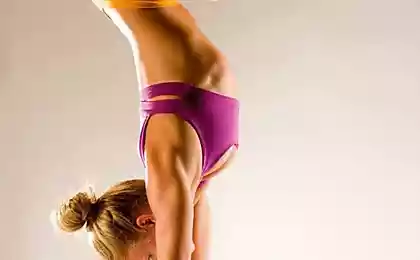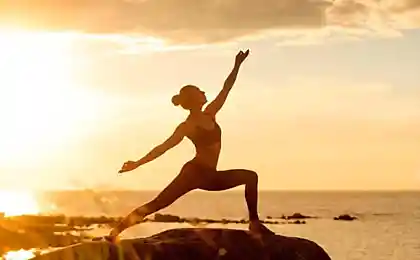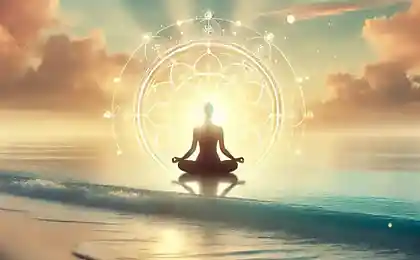746
Deep breath: what is it and why?
"Life is the period between one breath and the next. The man who half breathes, half lives. He who breathes correctly, acquires control of all your being." Hatha Yoga Pradipika
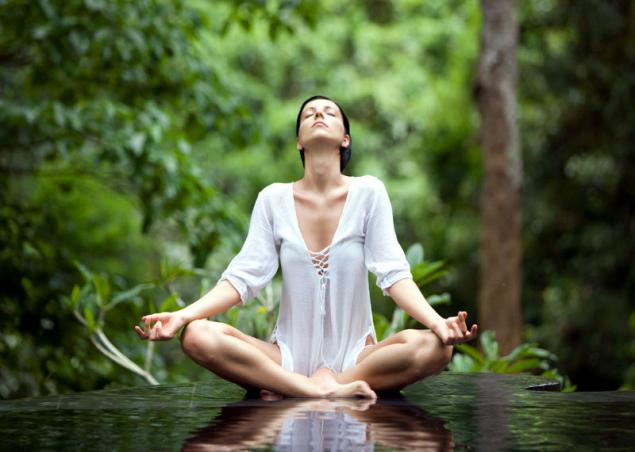
It is known that rapid, shallow breathing (compared with a healthy norm, which is now not at all) is causing anxiety, fears, sleep problems, and in the long term shortens the life. At the same time, a deep breath allows, from the point of view of health and "life in General":
If a person can learn through yoga is to breathe slowly and deeply, it's definitely good for your health and for yoga.
And what, exactly, is the difference between deep and shallow breathing "yoga" and "normal"? From the point of view, as they say, objective reality, and not some yoga reasons? It's simple. It is estimated that during the exercise "Complete yogic breath" — when the person sitting straight, breathing slowly and deeply, the lung gas exchange improves not just significantly, but 8 times!
The calculation in this case is simple:
The normal volume of inhalation and exhalation at rest is 0.5 l of air.
If a person (yogi) on the breath is expanding the abdomen and chest, the volume of inhalation can be increased by another 2 liter (inspiratory reserve);
Plus, if specially "dovidonyte" after a normal inhalation, including plunging the stomach, then manages to get rid of an additional 1.5 l of "spent" air — "expiratory reserve".
Thus, the volume of a normal inspiration or expiration (non-yoga) is 0.5 liters — 4 times less than the volume of air that is pumping the yogi: 0.5 + 2 + 1.5 = 4 HP
What we wanted to prove!)
So, after all, slow and deep breathing — the physiological, useful. And at the same time comfortable.
Deep breathing can be divided into 3 levels or stages
Matter learn yogic breathing exercises even more, perhaps, than in the asanas, important gradual. Do gradually, starting with 5-10 minutes, Potapenko can be the minute in the day, increase the duration of the training of breathing.
Study regularly, every day. If you miss 1 day — no danger in it, of course. (In particular can be gaps in women in the first days of menstruation and it is normal). But in General, the results come quickly, that's if you do every day even better at 2 times a day on an empty stomach. Study regularly and more, but without "fanaticism", without strain.
To take a deep breath of the familiar and the "background" — rather, as soon as you remember about it in any time of the day (but not night — can't sleep afterwards!) and in any situation, make a few "full yogic" breath cycles. That is, at once, without delay, to breathe deeply and slowly at least a few seconds or minutes. If you then get distracted by something — doesn't matter. The important thing is that you created a "reference point", and the breathing habit will change. I mean, think of the Full yoga breath often and a little "weaves" it into the fabric of ordinary life "beyond the Mat".
Gradually slow, deep — in this case, after passing the initial stage of development, absolutely comfortable — the breath will become your norm. Yeah, maybe you're not to breathe "life" as fully as on the Mat during class. But in General, the pattern of breathing will change. Maybe you will not use the volume of the upper parts of the lungs and including the "clavicular" breathing at 100%. Well, do not. But when you get in daily life will begin to "turn on" belly breathing, you will notice that you begun to be a pleasant change.published
P. S. And remember, only by changing their consumption — together we change the world! ©
Join us in Facebook and Vkontakte, and we're Classmates
Source: dayoga.ru/blog/glubokoe-dyhanie/

It is known that rapid, shallow breathing (compared with a healthy norm, which is now not at all) is causing anxiety, fears, sleep problems, and in the long term shortens the life. At the same time, a deep breath allows, from the point of view of health and "life in General":
- to improve concentration and productivity at work
- keep calm (and tone) in all situations and defend against stress
- to improve the results in the practice of dynamic and power yoga exercises, fitness and sports, to strengthen the immune system,
- to sharpen the sense of smell, if necessary — to quit Smoking
- to get rid of colds and congestion in the sinuses, and more.
- harmonizes the work of 5 different Pranas (energies in the body), especially the prana and Apana;,
- strengthens the manipura-chakra, if it is weakened. But if the breath is "collarbones", superficial, frail — she's probably just weak;
- allows you to maintain a decent, "working", "open" state Anahata chakra, the spiritual heart;
- gaining the amount of prana in the body is felt as a constant cheerfulness, the rise, the presence of an excess of forces, both physical and mental, "enthusiasm";
- a positive impact on the digestion and overall health, which is favorable to meditation;
- gives peace of mind and a constant concentration of attention, which is critical for safe and advanced asana practice, and — even more — to work effectively in pranayama, and absolutely critical — for meditation. Fussy mind can meditate, and the mind of a man who breathes "finely" is a hectic and shallow.
- if you combine the Complete yoga breath with a visualization of the rise of energy flow (from the feet to the abdomen, or from the feet to the crown) — the effect will be even better. On the exhale, the energy is "spread", distributed throughout the body. This rather primitive visualization, but it 100% works!
If a person can learn through yoga is to breathe slowly and deeply, it's definitely good for your health and for yoga.
And what, exactly, is the difference between deep and shallow breathing "yoga" and "normal"? From the point of view, as they say, objective reality, and not some yoga reasons? It's simple. It is estimated that during the exercise "Complete yogic breath" — when the person sitting straight, breathing slowly and deeply, the lung gas exchange improves not just significantly, but 8 times!
The calculation in this case is simple:
The normal volume of inhalation and exhalation at rest is 0.5 l of air.
If a person (yogi) on the breath is expanding the abdomen and chest, the volume of inhalation can be increased by another 2 liter (inspiratory reserve);
Plus, if specially "dovidonyte" after a normal inhalation, including plunging the stomach, then manages to get rid of an additional 1.5 l of "spent" air — "expiratory reserve".
Thus, the volume of a normal inspiration or expiration (non-yoga) is 0.5 liters — 4 times less than the volume of air that is pumping the yogi: 0.5 + 2 + 1.5 = 4 HP
What we wanted to prove!)
So, after all, slow and deep breathing — the physiological, useful. And at the same time comfortable.
Deep breathing can be divided into 3 levels or stages
- Breath "belly" — the lower parts of the lungs;
- Breath "breast" — the upper parts of the lungs;
- Breath "the clavicle", "neck" surface "doudah" (action of the body when it is the same as if we smell the air, just exhale it right).
Matter learn yogic breathing exercises even more, perhaps, than in the asanas, important gradual. Do gradually, starting with 5-10 minutes, Potapenko can be the minute in the day, increase the duration of the training of breathing.
Study regularly, every day. If you miss 1 day — no danger in it, of course. (In particular can be gaps in women in the first days of menstruation and it is normal). But in General, the results come quickly, that's if you do every day even better at 2 times a day on an empty stomach. Study regularly and more, but without "fanaticism", without strain.
To take a deep breath of the familiar and the "background" — rather, as soon as you remember about it in any time of the day (but not night — can't sleep afterwards!) and in any situation, make a few "full yogic" breath cycles. That is, at once, without delay, to breathe deeply and slowly at least a few seconds or minutes. If you then get distracted by something — doesn't matter. The important thing is that you created a "reference point", and the breathing habit will change. I mean, think of the Full yoga breath often and a little "weaves" it into the fabric of ordinary life "beyond the Mat".
Gradually slow, deep — in this case, after passing the initial stage of development, absolutely comfortable — the breath will become your norm. Yeah, maybe you're not to breathe "life" as fully as on the Mat during class. But in General, the pattern of breathing will change. Maybe you will not use the volume of the upper parts of the lungs and including the "clavicular" breathing at 100%. Well, do not. But when you get in daily life will begin to "turn on" belly breathing, you will notice that you begun to be a pleasant change.published
P. S. And remember, only by changing their consumption — together we change the world! ©
Join us in Facebook and Vkontakte, and we're Classmates
Source: dayoga.ru/blog/glubokoe-dyhanie/
Barley with mushrooms — simple and delicious!
40 above the scams you may come across during the journey


